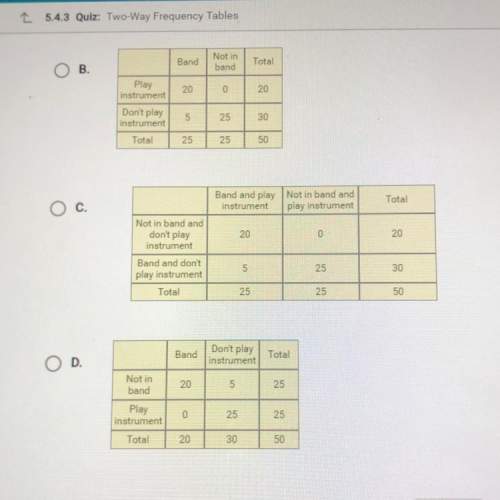
Mathematics, 26.03.2021 06:10 MIa2020
In ΔEFG, g = 6.1 cm, f = 7.3 cm and ∠F=69°. Find all possible values of ∠G, to the nearest 10th of a degree.

Answers: 1


Another question on Mathematics

Mathematics, 20.06.2019 18:04
Alocal concert promoter purchases 2 3/4 pages of ads. when one of the concerts is cancelled, the promoter cancels 1 5/8 pages of ads. how much advertising space is the concert promoter actually using?
Answers: 1

Mathematics, 21.06.2019 17:30
Which of the following is correct interpretation of the expression -4+13
Answers: 2

Mathematics, 21.06.2019 20:30
Does the function satisfy the hypotheses of the mean value theorem on the given interval? f(x) = 4x^2 + 3x + 4, [−1, 1] no, f is continuous on [−1, 1] but not differentiable on (−1, 1). no, f is not continuous on [−1, 1]. yes, f is continuous on [−1, 1] and differentiable on (−1, 1) since polynomials are continuous and differentiable on . there is not enough information to verify if this function satisfies the mean value theorem. yes, it does not matter if f is continuous or differentiable; every function satisfies the mean value theorem.
Answers: 1

Mathematics, 21.06.2019 21:00
In the figure below, triangle rpq is similar to triangle rts. what is the distance between p and q? a. 24 b. 42 c.50 d. 54
Answers: 1
You know the right answer?
In ΔEFG, g = 6.1 cm, f = 7.3 cm and ∠F=69°. Find all possible values of ∠G, to the nearest 10th of a...
Questions



Physics, 24.06.2020 01:01



Biology, 24.06.2020 01:01

Computers and Technology, 24.06.2020 01:01



Mathematics, 24.06.2020 01:01






Computers and Technology, 24.06.2020 01:01







